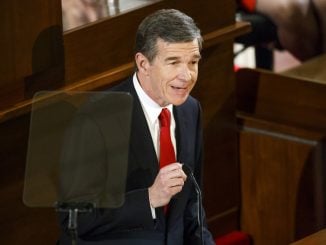RALEIGH — On Dec. 9, North Carolina Democratic Gov. Roy Cooper issued three more vetoes, bringing his overall total to 69 since taking office in January of 2017.
The three bills Cooper vetoed were House Bill 220 (Choice of Energy/Add’l Provisions), House Bill 294 (Sale of Salvage Vehicles) and Senate Bill 725 (Prohibit Private Money in Elections Admin.).
Amid his mounting vetoes, the Democratic Governors Association (DGS) has elected Cooper to be its new chairman. The DGA announced the move in a Dec. 11 tweet.
Cooper’s veto message of House Bill 220 said the measure “undermines North Carolina’s transition to a clean energy economy,” and that is “wrongly strips local authority” and “hampers” the public’s access to information.
House Speaker Tim Moore (R-Kings Mountain) responded to two of the governor’s vetoes, noting that House Bill 220 would “prohibit local governments from adopting any ordinance that prohibits connection, reconnection, modification, or expansion of an energy service based on the type or source of energy to be delivered to the end-user of the energy service.”
Moore said the bill also would “expand an exemption from public records for detailed plans and drawings of public buildings and infrastructure facilities, and add a new exemption for specific engineering, vulnerability, or detailed design information about proposed or existing critical infrastructure for energy, water, and wastewater utilities.”
“Gov. Cooper again fails to provide a substantive reason for vetoing common sense legislation,” said Moore. “Energy choice and ensuring our elections process is not in any way influenced by outside individuals — the bills vetoed today address the concerns of consumers and voters across all of North Carolina. Unfortunately the Governor prefers partisanship over common sense.”
“House Bill 220 specifically addresses energy choices for consumers, leaving household decisions like whether or not to have a gas stove in their home to consumers themselves,” said Rep. Dean Arp (R-Union) in the statement. “The heavy hand of government has no place in the personal decisions North Carolinians make for their households.”
Additionally, Moore said in a statement that Senate Bill 725 would “prohibit the State Board of Elections, county boards of elections, and county boards of commissioners from accepting private monetary donations, directly or indirectly, for conducting elections or employing individuals on a temporary basis.”
In his veto message, Cooper said money from outside entities were “needed for necessities” like masks, single-use pens and “other protective equipment” during 2020. He also accused the legislature for not properly funding elections board so outside grants would not be needed.
In a statement on Senate Bill 725, Sen. Paul Newton (R-Cabarrus), co-chair of the Senate Elections Committee, said, ”Private interests paying for vote collection and counting raises natural suspicions about election integrity. Gov. Cooper is setting a dangerous standard by not doing everything in his power to increase voter confidence.”
“There is nothing more quintessential to the role of government than funding and administering elections. Strangely, Gov. Cooper wants them funded by private interests,” said Newton. “The amount of legislative funding for elections is not the issue. This is potentially the beginning of a destabilizing era in which a core function of democracy — counting the votes — is funded by private interests.”
Outside grants and funds were not all put towards protective measures, as Cooper claims. A yet-undetermined amount of funds landed in hiring more temporary poll workers, but other grants went towards a mail-in ballots designs, and an online absentee ballot portal.
Mark Zuckerberg, through the Center for Tech and Civic Life (CLTC), funneled over $419 million into around 2,500 counties in 49 states during the 2020 election cycle.
Thirty-five North Carolina counties received CLTC funds. Overall. The state received over $5.395 million from the group. The N.C. State Board of Elections and Wake County received a million each and Durham received over $1.46 million.
Some of the CLTC grant money went towards making the “design of the request form and mail-in envelopes more user-friendly,” per the State Board of Elections (NCSBE).
A number of the areas receiving CLTC and other outside funds showed notable increases in Democrat voter turnout.
According to the NCSBE, 2020 saw the highest voter-turnout rate in recent history at 75.4 percent. In 2016, the voter turnout rate was 69% and it was 68% in 2012.
North State Journal previously reported on outside money in North Carolina elections from the Schwarzenegger Institute. The former California governor’s organization dropped almost $190,000 into 10 counties prior to the November 2020 election.



